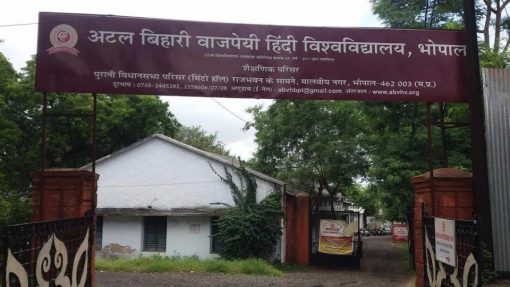
With a view to honour the first Prime Minister from the Bharatiya Janata Party, Atal Bihari Vajpayee, the Madhya Pradesh government established ‘Atal Bihari Vajpayee Hindi University’ in 2011 and introduced engineering and paramedical courses in Hindi for the first time. However, since then, the university has been running in to rough times.
Owing to the lack of infrastructure, shortage of faculty members, poor admission, funds crunch, and an absence of translated syllabus & books, the university has discontinued 92 courses of various streams from the current academic session which began last month. These courses include para-medical courses, diploma in foreign languages, masters in computer science and other courses. The university had been running 218 programmes till now.
Moreover, the university also discontinued the controversial ‘Garbh Sanskar’ programme which had drawn huge criticism since its launch due to a negative report by the internal committee. The committee had objected to the process of selection of pregnant females for the course.
“There were issues with certain courses which we thought to sort out before continuing with them again. As of now, we have done away with 92 courses,” said Prof. Ramdev Bhardwaj, vice-chancellor of the Hindi University.
Former Prime Minister Atal Bihari Vajpayee, who breathed his last at the All India Institute of Medical Science, New Delhi was known for his affection to the Hindi language. He was a great promoter of Hindi and a Hindi poet too.
The university which was inaugurated by the former President of India, Pranab Mukherjee on June 6, 2013, in Bhopal has a strength of about 800 students, most of who are pursuing courses such as yoga, naturopathy, ayurveda panchkarm, Masters in Hindi, and Bachelor of library sciences. The university has been getting Rs. 3.75 crore per year by the state government, which is inadequate to run the university as a major share of this goes to salary.
Speaking on length over it, vice chancellor Ramdev Bhardwaj further said, “Before introducing any course, we need proper infrastructure, qualified teachers and books and this is possible only with funds. And we get Rs. 3.75 crore per year which is not enough to provide all facilities.”
There have also been reports that the certificates which were distributed to the graduated students were not recognised. The students who had completed short-term courses like shorthand were rejected by the employers citing their degrees to be invalid as their courses have not been recognised by the UGC and AICTE.
When asked about the recognisation of courses, the VC replied, “There were several courses that were started without fulfilling the UGC and AICTE norms. Later when the university realised its fault, the courses were discontinued.'
The construction of the proposed 50-acre campus which was started at Mugalia Kot village on the outskirts of Bhopal in 2013 has not been completed yet. The university, as of now, operates out of two rented premises — classes are held at the old Vidhan Sabha building while its administrative office is located at the Patanjali Bhavan in the Bhoj university campus.
The Madhya Pradesh government introduced the concept of teaching engineering and paramedical courses in Hindi for students who could not comprehend English. Despite poor admission rates, the ruling BJP leaders continue to believe that the government’s contribution to the running of the university was not problematic. Instead, they blame the mismanagement of the university administration for the present state of affairs.
The communication cell in-charge of Madhya Pradesh Bharatiya Janata Party (BJP), Anil Soumitra, who is campaigning to save the Hindi university, said, “The BJP-led state government came up with the novel idea of studies in our mother tongue to break the myth that one cannot become an engineer through Hindi medium courses. However, the university failed to implement it properly. They don’t have any inclination towards promoting Hindi. They failed to attract students due to a dearth of basic facilities.”
However, the university officials, in turn, said lack of infrastructure and funds crunch were the key reason for the ailing condition of the university. The condition of this university shows the apathy of the BJP led government at the centre and in various states towards public funded universities, which has become a trend of late.




